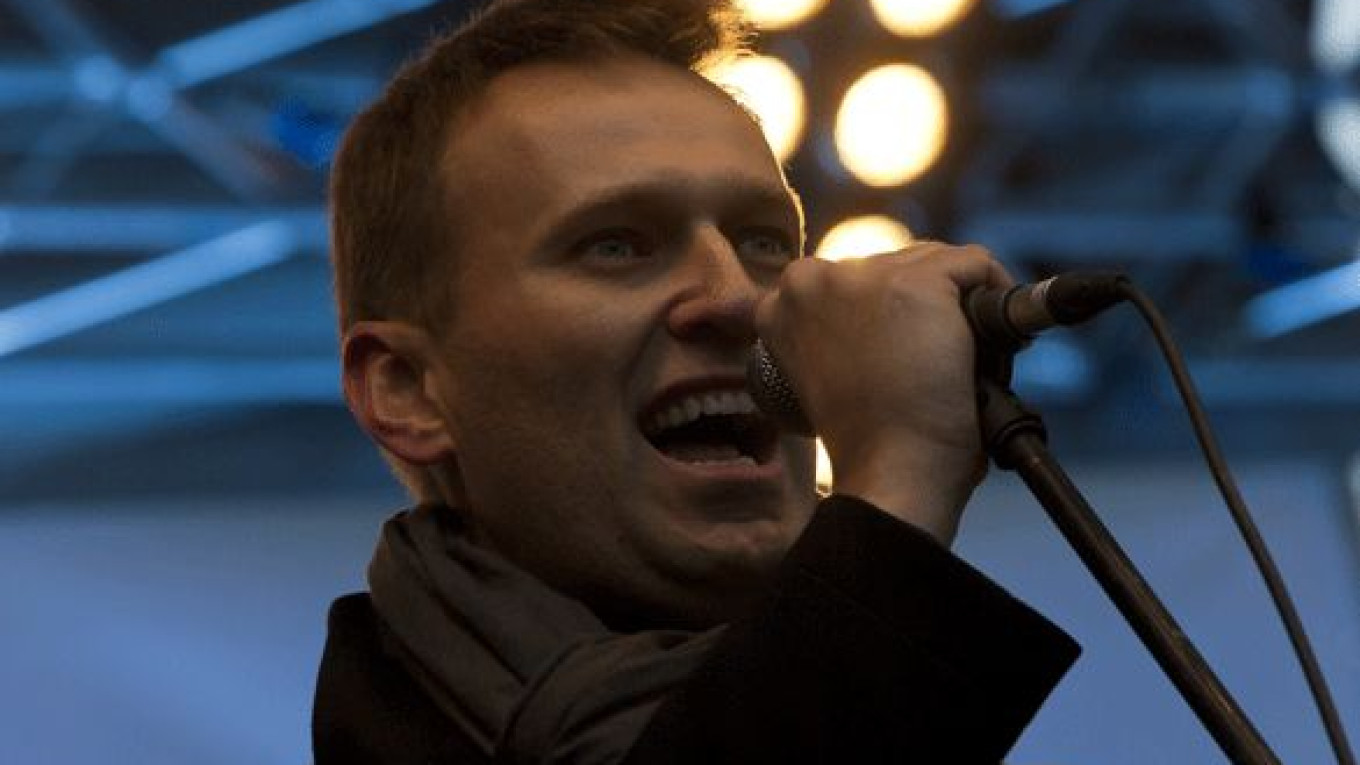Investigators on Friday opened a criminal case against prominent Kremlin critic Alexei Navalny, his brother Oleg and a group of unspecified suspects on charges of large-scale fraud and money laundering.
The criminal case is the latest in a string of investigations launched against Navalny, an anti-corruption blogger and member of the opposition's recently formed Coordination Council, who rose to prominence on the back of the yearlong protest movement against President Vladimir Putin's rule.
Investigators, who allege that Navalny and associates stole more than 55 million rubles ($1.8 million) and laundered 19 million rubles of that sum through a company owned by Navalny's parents, opened the case on the eve of an unsanctioned protest that Navalny attended.
If charged and convicted, the Navalnys face up to a decade in prison and a hefty fine.
Navalny, who was attending a meeting of Aeroflot's audit committee when investigators announced the case against him, implied on Twitter that the case was another attempt to silence him by putting pressure on his family.
"As I far as I understand, it's not enough for them to pressure me. Now they've started on my family as well," said Navalny, who sits on the airline's board of directors.
"I've read the Investigative Committee statement. … It's complete rubbish," he said, adding that investigators searched the company owned by his parents and brother's place of work in the early afternoon.
Explaining the ongoing investigation, the Investigative Committee said on its official website that the Navalnys' scheme was hatched in spring 2008, when Oleg Navalny, a manager at a subsidiary of Russian Post, convinced a large commercial firm backed by foreign capital to sign a contract to transport mail with a company founded by Alexei Navalny.
The statement said the company Navalny founded, called Main Subscription Agency and registered in the name of an unidentified acquaintance, then offered the large commercial firm freight services at an inflated price and outsourced these services to a separate transportation company managed by another unidentified acquaintance of Oleg Navalny.
According to investigators, the scheme ran from August 2008 to May 2011, during which time Main Subscription Agency was paid for transporting mail between Yaroslavl and Moscow. In a further twist, investigators said the commercial firm significantly overpaid the company allegedly controlled by the Navalny brothers.
Through this elaborate ruse, investigators said, the Nalavny brothers pocketed over 55 million rubles, the bulk of which was spent on "their own needs" while the rest was transferred to the Kobyakovo Willow-Weaving Factory, a Moscow region business owned by Navalny's parents, to pay for rent and raw materials.
In August, investigators and Federal Security Service officers raided Navalny's parents' willow-weaving factory.
At the time, Navalny suspected that they were looking for evidence implicating him in the theft of timber products from the KirovLes state company, an alleged scam that reportedly cost the regional government 16 million rubles. Navalny was working as an adviser to Kirov region Governor Nikita Belykh at the time the theft was supposed to have taken place.
The KirovLes investigation was later dropped after law enforcement officials found that Navalny had not committed any violations. The regional investigator who oversaw the inquiry, Major-General Alexander Panov, was fired in early December after a dressing-down by his boss, Investigative Committee chief Alexander Bastrykin, news reports said.
"You have a man named Navalny. You had a criminal case against him, and you stopped it on the quiet," Bastrykin said while addressing Panov in November.
Belykh later denied that Panov's firing had anything to do with the Navalny case and said Panov resigned due to family reasons. He didn't elaborate further.
On Friday, investigators said they were running additional checks to determine the Navalnys' role in the elaborate fraud case announced that morning.
It was not immediately clear whether Navalny would be summoned for questioning. In June, Navalny was summoned to the Investigative Committee on the same day as a March of Millions protest, preventing him from addressing supporters.
Speaking to liberal-leaning radio station Ekho Moskvy, Lyudmila Navalny, mother of Alexei and Oleg, characterized investigators' actions as "arm-twisting" aimed at convincing her son to give up political activism.
Related articles:
A Message from The Moscow Times:
Dear readers,
We are facing unprecedented challenges. Russia's Prosecutor General's Office has designated The Moscow Times as an "undesirable" organization, criminalizing our work and putting our staff at risk of prosecution. This follows our earlier unjust labeling as a "foreign agent."
These actions are direct attempts to silence independent journalism in Russia. The authorities claim our work "discredits the decisions of the Russian leadership." We see things differently: we strive to provide accurate, unbiased reporting on Russia.
We, the journalists of The Moscow Times, refuse to be silenced. But to continue our work, we need your help.
Your support, no matter how small, makes a world of difference. If you can, please support us monthly starting from just $2. It's quick to set up, and every contribution makes a significant impact.
By supporting The Moscow Times, you're defending open, independent journalism in the face of repression. Thank you for standing with us.
Remind me later.


